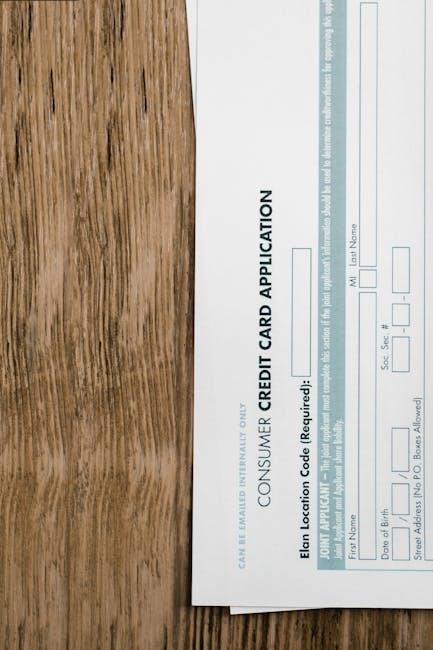The Victorian private security licence application form is a crucial document for individuals and businesses seeking authorization to operate in Victoria’s private security sector. It streamlines the process of obtaining necessary credentials, ensuring compliance with legal and industry standards. The form is accessible via the LRD ePortal, offering a structured approach to submitting personal details, qualifications, and background checks, essential for a seamless application experience.

1.1 Overview of the Victorian Private Security Licence
The Victorian Private Security Licence is essential for individuals and businesses operating in Victoria’s private security sector. It authorizes activities such as security guarding, crowd control, and private investigation. The licence ensures compliance with legal standards, public safety, and professional conduct. Applicants must meet specific eligibility criteria, including age, residency, character checks, and required training. The licence is regulated by Victorian authorities, ensuring accountability and integrity within the industry. Holding this licence demonstrates adherence to industry standards and legal obligations, fostering trust and professionalism in security services. The application process is designed to be straightforward, with guidance available to assist applicants in meeting all requirements efficiently.

1.2 Importance of the Application Form
The Victorian Private Security Licence application form is a critical gateway for individuals and businesses to enter the security industry legally; It ensures applicants meet essential criteria, such as character, training, and residency requirements, while maintaining industry standards. The form streamlines the licensing process, reducing administrative burdens and ensuring compliance with legal obligations. Accurate and complete submission of the form is vital, as errors or omissions can delay processing or result in rejection. By requiring detailed personal and professional information, the form helps regulators assess suitability for a security licence, ultimately safeguarding public safety and maintaining the integrity of Victoria’s private security sector.
1.3 Brief History of Security Licensing in Victoria
The regulation of Victoria’s private security industry has evolved significantly over the years to ensure public safety and professionalism. The formal licensing system was established to standardize practices and enforce compliance with legal requirements. Key reforms have included the introduction of mandatory training, background checks, and character assessments to ensure licence holders meet stringent criteria. The process has become more streamlined with the advent of online applications via the LRD ePortal, reducing administrative burdens. Historical developments have focused on balancing industry growth with public protection, ensuring that security services operate ethically and responsibly. These changes reflect Victoria’s commitment to maintaining a secure and reliable security sector.

Eligibility Criteria for a Security Licence in Victoria
Eligibility for a Victorian security licence is based on meeting specific requirements, including age, residency, character, and training qualifications, ensuring applicants are suitable for the role.
2.1 Age Requirements
To apply for a Victorian security licence, applicants must be at least 18 years old. This age requirement ensures that individuals are legally recognized as adults and capable of assuming the responsibilities associated with a security role. Proof of age is mandatory and can be provided through valid identification documents such as a driver’s licence, passport, or birth certificate. This criterion is non-negotiable, as it aligns with legal standards and ensures that licence holders possess the necessary maturity and understanding of their duties. The age requirement is a fundamental aspect of the eligibility criteria, ensuring that only qualified individuals enter the private security industry in Victoria.

2.2 Residency and Citizenship Requirements
Applicants for a Victorian security licence must meet specific residency and citizenship criteria. They must be Australian citizens, permanent residents, or hold a valid visa allowing them to work in Australia. Proof of residency, such as a utility bill or rental agreement, is required to confirm their address. While applicants do not need to reside in Victoria specifically, they must provide a valid Australian address. Citizenship or visa status is verified through documents like passports or visa grants. These requirements ensure that licence holders are legally permitted to work in Victoria’s private security industry, maintaining compliance with national and state regulations. Residency and citizenship checks are essential for verifying an applicant’s legal standing and eligibility.
2.3 Character Requirements and Background Checks
Applicants for a Victorian security licence must demonstrate good character and undergo rigorous background checks. A National Police Check is mandatory to assess any criminal history. Additionally, a security assessment may be required, depending on the licence type. Applicants must provide written character references from reputable individuals who can vouch for their integrity. The form also requires consent for a national police check or ASIO security assessment. These checks ensure that licence holders are trustworthy and suitable for roles in the private security industry. Failure to meet character requirements or disclose relevant information can result in application rejection. Background checks are critical to maintaining public safety and upholding industry standards in Victoria.
2.4 Required Training and Qualifications
To apply for a Victorian security licence, applicants must complete specific training and hold relevant qualifications. The most common requirement is a Certificate II or III in Security Operations, depending on the licence type. These qualifications are typically obtained through approved Registered Training Organisations (RTOs). Applicants must provide proof of successful course completion, such as a statement of attainment or certificate. Additionally, some roles may require first aid training or an emergency procedure course. These qualifications ensure that licence holders possess the necessary skills and knowledge to perform their duties effectively and safely. Meeting these training requirements is essential for a successful application and compliance with industry standards in Victoria.
The Application Form: Key Components
The Victorian security licence application form is structured to collect essential personal and professional details, ensuring compliance with legal requirements. It includes mandatory fields, attachments, and clear instructions for a seamless submission process.
3.1 Structure of the Application Form
The Victorian security licence application form is designed with a clear and logical structure to facilitate an efficient process. It begins with personal details, followed by sections for residency, character references, and professional qualifications. Mandatory fields ensure all necessary information is provided, while attachments such as proof of identity and training certificates are clearly outlined. The form also includes a declaration section for employer responsibilities, emphasizing compliance with industry standards. This structured approach helps applicants navigate the process smoothly, reducing errors and ensuring all requirements are met for a successful submission.
3.2 Mandatory Fields and Information
The Victorian security licence application form requires specific mandatory fields and information to ensure compliance and thorough evaluation. Applicants must provide personal details such as name, date of birth, contact information, and residential address. Proof of identity and residency are essential, along with character and professional references. A national police check is mandatory to assess suitability. The form also includes a declaration section for employer responsibilities, ensuring adherence to legal obligations. These requirements streamline the process and ensure all necessary documentation is submitted, facilitating a smooth and efficient application experience.
3.3 Attachments and Supporting Documents
When submitting the Victorian security licence application, specific attachments and supporting documents are required to complete the process. These include proof of identity, residency, and character references, which are essential for verifying eligibility. A national police check is mandatory, and applicants must also provide a consent form for the check. Additionally, professional references and qualifications from approved training programs must be attached. The application may also require a declaration signed by the employer, outlining their responsibilities. Ensuring all necessary documents are included prevents delays and ensures a smooth evaluation process. Incomplete submissions may result in processing hold-ups, emphasizing the importance of thorough preparation.

Submission and Processing of the Application
The Victorian security licence application can be submitted online via the LRD ePortal, ensuring a streamlined process. Once received, applications are reviewed for completeness, and fees are processed. Processing times vary, but updates are provided through the portal, allowing applicants to track their status efficiently.
4.1 Methods of Submission
The Victorian security licence application can be submitted online through the LRD ePortal, which is the most efficient method. Applicants must create an account, fill out the form, and upload required documents. The online system ensures that all information is captured accurately and allows for real-time tracking of the application status. Additionally, the portal provides clear instructions and guidelines to assist applicants in completing the process smoothly. This method is preferred due to its convenience and faster processing times compared to traditional submission methods. Once submitted, applicants receive a confirmation and can monitor progress through the portal, ensuring transparency throughout the process.
4.2 Application Fees and Payment Methods
The Victorian security licence application requires payment of designated fees, which vary based on the type and duration of the licence. Payments can be made securely online via the LRD ePortal using credit or debit cards, or through other accepted digital payment methods. It is essential to review the fee structure before submitting the application, as fees are non-refundable once the process is initiated. Applicants are advised to ensure they have the correct payment details ready to avoid delays. Upon successful payment, a confirmation receipt is generated, which should be retained for records. This step is critical for completing the application process efficiently and ensuring compliance with regulatory requirements.
4.3 Processing Time and Status Updates
The processing time for a Victorian security licence application varies depending on the completeness of the submission and the speed of background checks. Applicants can track their application status online through the LRD ePortal. The licensing authority typically communicates via email, so it is crucial to monitor your inbox for updates. Delays may occur if additional information or documentation is required. Ensuring all details are accurate and attachments are complete can expedite the process. Once approved, the licence is issued, enabling the applicant to legally work in Victoria’s private security sector. Regularly checking the portal and responding promptly to any requests helps maintain a smooth processing experience.
Supporting Documents for the Application
Key documents include proof of identity, residency, character references, and a National Police Check. These ensure eligibility and compliance with Victoria’s private security licensing regulations.

5.1 Proof of Identity and Residency
Applicants must provide valid documents to confirm their identity and residency, such as a passport, driver’s licence, or birth certificate. Utility bills or rental agreements can verify residency. These documents must be current and certified to ensure authenticity. The Victorian private security licence application requires precise and accurate information to process the request efficiently. Ensuring all details match the provided documents is crucial for approval. This step is essential to comply with legal requirements and maintain security standards in the industry.
5.2 Character References and Professional References
Character and professional references are essential for a Victorian security licence application. These documents provide insight into an applicant’s integrity and reliability. Character references should be written by reputable individuals, such as employers or community leaders, attesting to the applicant’s good character. Professional references must detail the applicant’s work experience and skills relevant to the security industry. Both types of references help assess the applicant’s suitability for the licence. They must be credible and include specific examples of the applicant’s qualifications and conduct. This step ensures that only trustworthy individuals are granted a security licence in Victoria.
5.3 National Police Check and Security Assessments
A National Police Check is a mandatory requirement for the Victorian security licence application. This document verifies an applicant’s criminal history and ensures compliance with industry standards. The check must be conducted by an accredited body, such as the Australian Federal Police or a state-based provider. Additionally, a security assessment may be required to evaluate the applicant’s suitability for the licence. This process involves a thorough review of the individual’s background to determine their reliability and trustworthiness. Both the police check and security assessment are critical for maintaining the integrity of the private security sector in Victoria. Applicants must submit these documents along with their application form for a successful review.

Regulations and Compliance
Applicants must adhere to Victoria’s legal obligations, ensuring compliance with industry standards and codes of practice. Employers bear responsibility for meeting all regulatory requirements during the application process.

6.1 Legal Obligations for Licence Holders
Holders of a Victorian private security licence must comply with all legal requirements, including adhering to industry standards and codes of practice. Licence holders are obligated to maintain proper conduct, ensuring their actions align with the law and professional ethics. Employers must also ensure their employees meet all regulatory obligations, including providing necessary training and oversight. Additionally, licence holders are required to display identification badges while on duty and maintain accurate records as mandated by authorities. Failure to comply with these legal obligations can result in penalties, including licence suspension or revocation. It is essential for licence holders to stay informed about updates to regulations to avoid non-compliance.
6.2 Employer Responsibilities in the Application Process
Employers play a critical role in the Victorian private security licence application process. They must ensure that all employees meet the necessary eligibility criteria and comply with legal obligations. Employers are responsible for verifying the accuracy of the information provided in the application and ensuring that the nominated person signs the employee responsibility note. This note outlines the employer’s commitment to meeting all regulatory obligations. Employers must also provide necessary training and oversight to ensure their employees adhere to industry standards and codes of practice. Failure to fulfill these responsibilities can result in penalties, including licence suspension or revocation. Employers must stay informed about regulatory updates to maintain compliance throughout the application and employment process.

6.3 Industry Standards and Codes of Practice
Industry standards and codes of practice are essential for maintaining professionalism and accountability in Victoria’s private security sector. These guidelines ensure that licence holders operate ethically and legally, upholding public safety and trust. The Victorian government enforces strict standards, requiring licence holders to adhere to specific codes of conduct, training requirements, and operational protocols. Compliance with these standards is non-negotiable and is regularly monitored to ensure adherence. Employers and individuals must familiarize themselves with these codes to avoid penalties and maintain their licences. Resources like ABLIS provide detailed information on compliance responsibilities, helping applicants and licence holders navigate the regulatory landscape effectively.
Assistance and Resources
Guides, tutorials, and FAQs are available to assist with the application process. The LRD ePortal and Victoria Police website offer detailed resources, ensuring a smooth experience for applicants.
7.1 Guides and Tutorials for Completing the Form
Detailed guides and tutorials are available to assist applicants in completing the Victorian private security licence application form. These resources, accessible via the LRD ePortal and Victoria Police website, provide step-by-step instructions to ensure accuracy and compliance. Video tutorials and downloadable PDF guides outline eligibility criteria, required documentation, and form submission processes. Additionally, sample character reference templates are provided to help applicants prepare necessary supporting documents. These tools are designed to simplify the application process, reducing errors and ensuring a smooth experience. Regular updates reflect changes in regulations, making them reliable sources for current requirements.
7.2 Frequently Asked Questions (FAQs)
Frequently Asked Questions (FAQs) about the Victorian private security licence application form are readily available on the LRD ePortal and Victoria Police website. These resources address common queries, such as processing times, required documents, and eligibility criteria. Applicants can find answers to questions about character references, background checks, and fee payments. Additionally, FAQs provide guidance on submission methods, including online applications and in-person options. They also clarify requirements for employer declarations and national police checks. These resources are regularly updated to reflect regulatory changes, ensuring applicants have access to accurate and current information. Checking the official FAQs is highly recommended to resolve doubts and ensure a smooth application process.
7.3 Contact Information for Support and Inquiries
For assistance with the Victorian private security licence application form, applicants can contact the Licensing and Regulation Division (LRD) via phone or email. The LRD website provides detailed contact information, including phone numbers and email addresses, to address queries related to the application process. Additionally, the Victoria Police website offers a dedicated support section with contact details for specific inquiries. Applicants can also visit the LRD office in person during business hours for face-to-face assistance. Support services are available to help with technical issues, document requirements, and general guidance, ensuring a smooth application experience. Contacting the LRD or Victoria Police directly is recommended for any unresolved concerns or clarifications.


